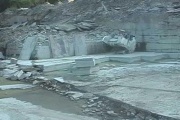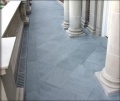Bluestone
Description
1) Common name for hydrated sulfate copper sulfate prior to the 1800s when chemical compound names were standardized (Schur 1985). It was also called copper sulfite.
2) Any hard, fine-grain sandstone that is blue or gray in color. In the US, bluestones are quarried in New York and Pennsylvania. They also occur in England where they were used in the construction of Stonehenge and in the Victorian volcanic plains of Australia. Bluestones are often used for walks, steps, and lintels because of good cleavage along the bedding plane.
Synonyms and Related Terms
1: copper sulfate; copper sulfite; blue vitriol
2: Pennsylvania bluestone; Euclid bluestone; Hudson River bluestone; North River bluestone, Genesee Valley bluestone
Additional Information
S. Schur, "Conservation Terminology: A Review of Past & Current Nomenclature of Materials", Technology and Conservation, 1985.
Additional Images
Authority
- G.S.Brady, G.S.Brady, Materials Handbook, McGraw-Hill Book Co., New York, 1971 Comment: p. 235
- Susan E. Schur, Susan E. Schur, Conservation Terminology: A review of Past & Current Nomenclature of Materials, Technology and Conservation, Spring (p.34-39); Summer (p.35-38); Fall (p.25-36), 1985
- Dictionary of Building Preservation, Ward Bucher, ed., John Wiley & Sons, Inc., New York City, 1996
- Anne Grimmer, Anne Grimmer, Glossary of Building Stone Terms, A Glossary of Historic Masonry Deterioration Problems and Preservation Treatments, National Park Service, Washington DC, 1984
- Wikipedia, the free encyclopedia, at http://www.wikipedia.com Comment: http://en.wikipedia.org/wiki/Pennsylvania_Bluestone (Accessed Feb. 10, 2006)
- Random House, Random House, Webster's Encyclopedic Unabridged Dictionary of the English Language, Grammercy Book, New York, 1997
- The American Heritage Dictionary or Encarta, via Microsoft Bookshelf 98, Microsoft Corp., 1998


